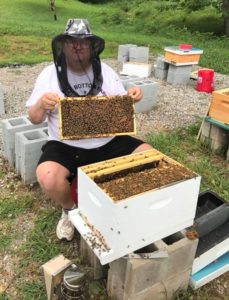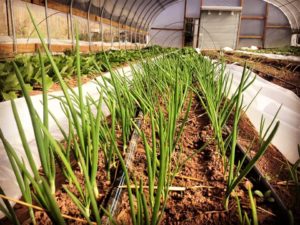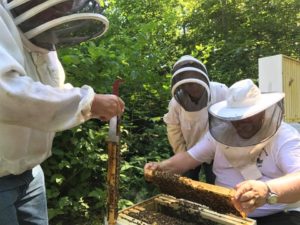
A Farm Service Agency program helped the Grandons recover from bee and hive losses in 2016.
By Lauren Moore, Public Affairs Specialist
Eric Grandon is an Army veteran who never dreamed of being a farmer. Eric and his wife, Mary, now own and operate Sugar Bottom Farm in Clay County, West Virginia, where they produce honey, vegetables, fruit, and molasses.
Battlefields to Bees
After joining the Army at 19, Eric served in four peace-time missions in the Middle East and two combat missions, Operations Desert Storm and Iraqi Freedom.
After retiring from his military service, he was introduced to the Veterans and Warriors Agriculture program, through the West Virginia Department of Agriculture, and eventually opened an agricultural operation of his own.
“When I retired from the National Guard, I had post-traumatic stress disorder and I didn’t do anything for two years,” Eric said. “I met James McCormick, the director of the Veterans and Warriors Agriculture program, and he recommended that I try agriculture. I loved it.”
Eric bought their farm from his father-in-law and began producing molasses.
“Now we grow almost everything you would find on a salad bar: romaine lettuce, grape tomatoes, cucumbers, green onions, mini sweet peppers, snap peas, rainbow carrots, slicing tomatoes, broccoli, and cabbage,” Eric said. “We also grow watermelon, strawberries, raspberries, and blueberries, but my favorite thing to grow is honeybees.”
The Grandons market some of these farm-fresh products through their new community supported agriculture program.
Disaster Recovery
Since opening his operation, Eric has participated in a variety of USDA Farm Service Agency programs.
While farm loan programs have given him access to capital to grow his operation, he protects his eligible crops annually through the Noninsured Crop Disaster Assistance Program.
Like many West Virginia producers, the Grandon family was impacted by flash flooding in 2016, losing their summer crops and 18 beehives.
“It was the FSA to my rescue. I was educated about their Emergency Assistance for Livestock, Honey Bees, and Farm-raised Fish Program, which helped with compensation for not only the bees, but the hives, too,” he said.

Eric protects his eligible crops annually through the Noninsured Crop Disaster Assistance Program.
Conservation and Solar Energy
Sugar Bottom Farm was named the Elk Conservation District’s 2018 Farm of the Year. With USDA’s Natural Resources Conservation Service, Eric is turning five acres of land into a habitat for pollinators, including native bees and his honeybees, by planting native grasses and wildflowers.
He made other improvements to the operation with assistance from the Environmental Quality Incentives Program and Agricultural Management Assistance Program. Through these programs, Eric has added a high tunnel, and plans to install a well system and solar pump.
The Grandons also received funding through the Rural Energy for America Program to add a solar array on the farm. The program, administered by USDA Rural Development, assists agricultural producers and small businesses develop renewable energy systems and make energy-efficiency improvements to their operations.
Giving Back
Eric dedicates some of his time to educate aspiring beekeepers, including other veterans. Since opening a free training program in March 2017, he has welcomed over 500 visitors wanting to learn the trade. He also offers a free adopt-a-hive program for people who want to work bees, but don’t have access to land.
He also serves his fellow farmers as a county committee member of the Clay County Farm Service Agency. County committee members are elected by their peers and are a direct link between the agricultural community and USDA.
“Farming has given me a chance to look ahead to next year, and the year after that, like never before. In any other job that I’ve worked the only thing I thought about was the weekend or my next vacation,” said Eric. “I absolutely love farming.”

Eric dedicates some of his time to educate aspiring beekeepers.
More Information
USDA wants to ensure that veterans looking to return home, or start a new career on a farm or in a rural community have the tools and opportunities they need to succeed. Learn about opportunities for America’s heroes.
USDA offers a variety of risk management, disaster assistance, loan, and conservation programs to help agricultural producers in the United States weather ups and downs in the market and recover from natural disasters as well as invest in improvements to their operations. Learn about additional programs.
For more information about USDA programs and services, contact your local USDA service center.
JOIN THE CONVERSATION
For the digital version of this blog, visit #FridaysOnTheFarm.
Follow the #FridaysOnTheFarm story series and other news you can use on farmers.gov and @Farmersgov Twitter.






2 Responses to A Hero and His Honeybees